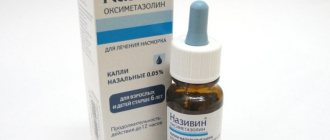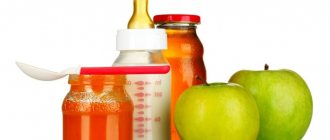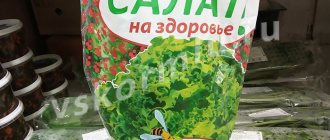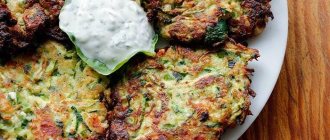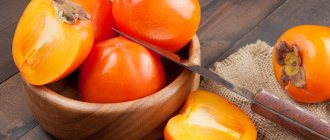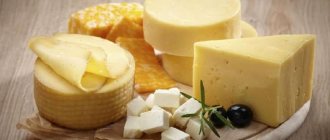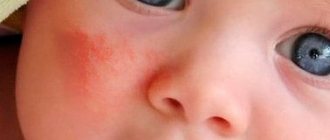Every mother thinks about her diet when breastfeeding. After all, the elements, along with milk, enter the baby’s still fragile body. It can both benefit and harm the baby.
Most babies suffer from colic and increased gas production before the age of three months. In addition, infants become allergic to many foods. Therefore, in the first three months, doctors recommend that a nursing mother follow a special diet.
With the formation of intestinal microflora and the gradual adaptation of the child’s body, a nursing mother can introduce new products and dishes to the menu. However, it is important to carefully monitor your baby’s reaction!
At first, a nursing mother can only eat apples as a fruit, and then only in baked form. And three months after giving birth, you can already eat pears, but in small doses and in the absence of a negative reaction from the baby.
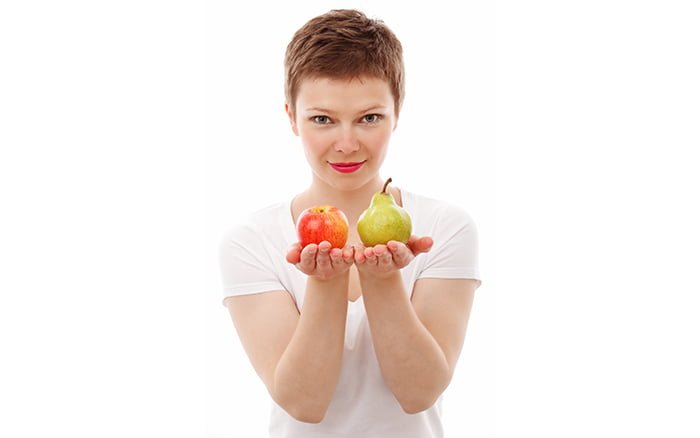
Is it possible to eat a pear while breastfeeding?
The fruit, along with apples, is considered one of the safest fruits. It is classified as a practically hypoallergenic product, therefore, when breastfeeding, there are virtually no contraindications for eating pears for young mothers, and even vice versa. They are recommended as the best remedy for eliminating vitamin and mineral deficiencies.
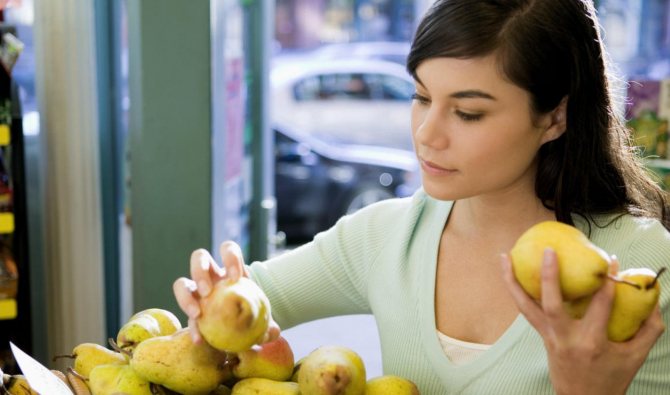
Did you know? In ancient times, pears were used not only as a fruit plant, but also as a medicinal plant.
For example, in Greece, crushed fruits were used as the best remedy for motion sickness.
Which is better to eat: green or yellow?
There are several common pear hybrids:
- Duchess (bright yellow with a red blush).
- Chinese pear (pale yellow).
- Conference (oblong yellow-green with a rich taste).
- Williams (yellow-green).
Pediatricians recommend only two varieties for feeding nursing mothers:
- Williams.
- Conference.
These juicy types are rich in microelements and are the safest, while Duchess can provoke an allergic reaction (due to the reddish tint of the skin), and Chinese pear is imported from abroad.
Beneficial and harmful properties of pears
Pear, like any food product, has not only beneficial qualities, but also harmful properties that can have a rather negative impact on the body of a nursing woman and her baby. Every young mother should be familiar with this information before including the product in her diet in order to prevent any negative consequences.
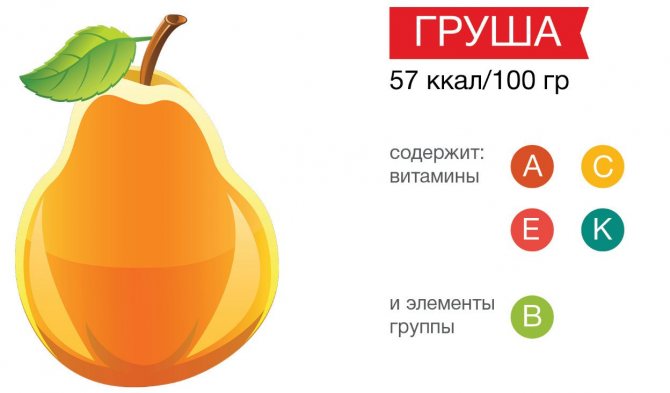
For mother
For a young mother, fruit is indispensable in the diet. It is the main source of all kinds of substances with which you can improve the condition of the body in a few weeks. This is achieved by influencing:
- condition of the circulatory system and small vessels;
- blood composition;
- immunity;
- work of higher nervous activity;
- functioning of the digestive tract;
- endocrine system, thyroid gland and metabolism.
Did you know? The closest relatives of pears are roses. The flower has many similar morphological features with them (leaf shape, flower structure, etc.), due to which they are united under the common Rosaceae family.
When consumed in moderation, the fruit brings only benefits to the mother's body, with the exception of cases of individual intolerance to individual components of the fetus, as well as excess consumption.
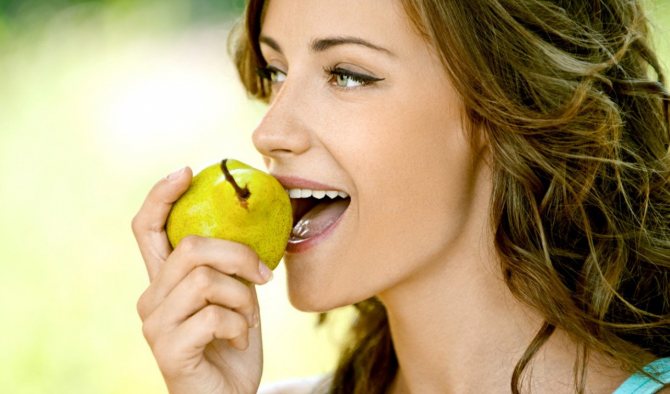
For babies
The product is no less useful for babies; it saturates breast milk with the following substances:
- fiolic acid - improves hematopoiesis;
- carotene - affects the formation of the visual apparatus;
- B vitamins - have a positive effect on the functioning of the nervous system, hemoglobin synthesis and immune activity;
- ascorbic acid - has an antioxidant effect;
- a complex of various microelements - activate the formation of the skeletal system, metabolism, as well as the work of other organs and systems.
Important! Not all pear hybrids are considered safe for babies and nursing mothers. It is best to focus your attention on the Williams and Conference varieties.
When consumed in moderation, the substances contained in the fruit are absolutely safe for infants. But, it is common for the fetus to saturate breast milk with fiber. It becomes the main cause of excessive gas formation in the intestines and colic in the baby.
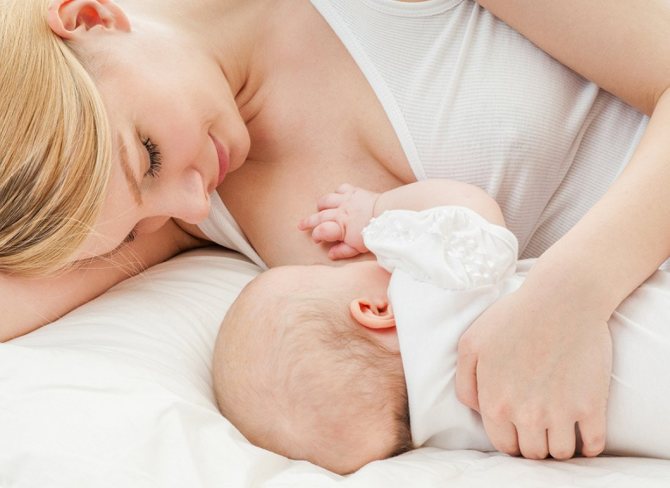
In addition, you should definitely remember that fresh pears in vegetable stores are treated with a variety of preservatives. Harmful substances often penetrate from the peel into the pulp, which leads to the penetration of toxins into breast milk.
Features of eating pears during breastfeeding periods
Although the fruit is considered safe, it should be introduced into the diet gradually. A child’s body is not prepared for many substances in adult food, so you should not abuse it. Next, we will consider in detail when the fetus can be safely included in the diet of a nursing mother.
At 1 month
In the first month after birth, most doctors recommend feeding the baby exclusively with breast milk. But, it must be produced in a woman’s body thanks to simple but sufficiently nutritious food. Since pear is a rich complex of various compounds and aromatic substances, it is not recommended to include it in the menu during the first month of breastfeeding. However, in the first month it is permissible to use pear compote made from dried fruits.
You will be interested to learn about the features of storing pears for the winter at home.
At 2 months
From the second month, the baby’s body undergoes a lot of changes, its digestive system becomes more advanced. But this is not enough to cope with many unfamiliar substances. Therefore, at this stage, the fruit is still not recommended for nursing mothers. But, if you want to diversify your diet, then a few slices of the fruit are allowed.
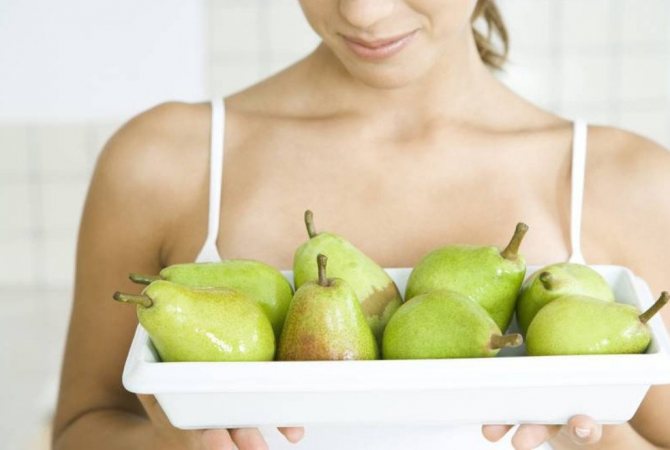
At 3 months
In the third month of breastfeeding, the danger of colic disappears, so pears can be safely added to the diet. The fruit is consumed fresh, in small portions. If you have eaten the fruit before and the baby is not allergic to it, from the third month you can eat 1 fruit per day. It is prohibited to eat canned or baked fruit.
How to choose the right fruits?
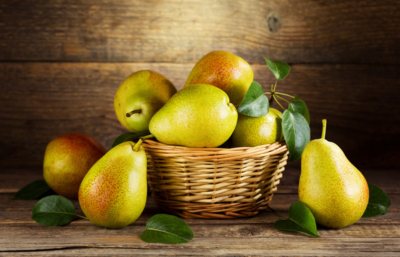
The fruit should be ripe and slightly soft. It is worth buying pears at the market or from trusted farmers who can honestly say that the fruits are homemade.
Pears from the supermarket should be purchased only in exceptional cases if there are no other alternatives, since the pears in chain stores are often imported. Such fruits are grown under the influence of pesticides, and a minimal amount of vitamins remains in them.
In addition, they are picked unripe and doused with sulfur for long-term storage. But such fruits look attractive to buyers.
Get into the habit of buying “non-marketable” fruits (but ripe, not green or rotten), as a rule, they are least susceptible to chemicals.
Norm for the day
Every day a nursing woman needs to eat about 400 g of all kinds of fruits. But this does not mean that a pear can completely satisfy the body’s daily needs. Without harm to the baby's health, a nursing mother can consume up to 150 g of fruit (1 medium fruit) per day. At the same time, you should not consume it every day; to provide the body with everything necessary, the fruit should be eaten no more than 2-3 times a week. This rule only applies if the baby reacts positively to the fruit.
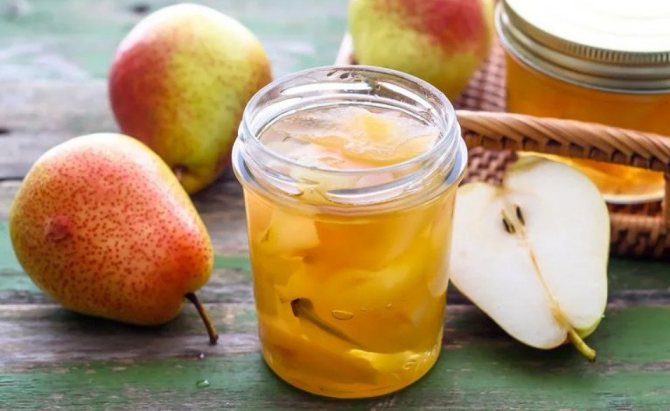
In case of allergies, colic and other digestive disorders, it is prohibited for nursing mothers to use it. For canned pears, the norm is no more than 150 g, and this dish can be consumed no more than 2 times a week. Regarding preserves and jams, the situation is somewhat different. You can eat no more than 5 tablespoons of such sweets per day; they are introduced into your diet gradually and in small portions (1-2 tablespoons per day)
General rules for safe consumption of pears during breastfeeding:
| Fresh fruit | Canned |
|
|
Methods for preparing pears
Fresh pear is considered the most useful; it is also acceptable to cook some dishes using it. The safest is baked fruit - in this case, it is necessary to prepare the dish without any spicy additives (for example, cinnamon or cardamom) and additional sweeteners.
Important! While breastfeeding, young mothers are prohibited from eating pears in combination with yeast dough. Such food saturates breast milk with components that provoke colic in the baby.
You can also prepare dried fruits; they are perfect both as an independent dish for satisfying hunger, and as a flavorful base for making compotes. The most common pear dishes are jams and preserves, but during their preparation it is necessary to monitor the amount of sugars. It is recommended to reduce their concentration by half from the prescribed norm.
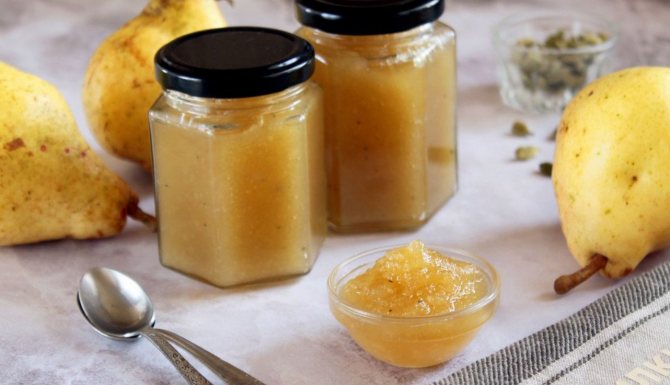
Combination with other products
When feeding a baby, it is not recommended to combine pears with any food products. Fresh fruit must be eaten as an independent dish, without any spices or anything else. Regarding canned fruit, it can be used as an addition to baked goods (oatmeal and biscuit cookies, bagels, etc.), this rule also applies to all kinds of jams and preserves.
Homemade recipes for moms
Salad with cheese
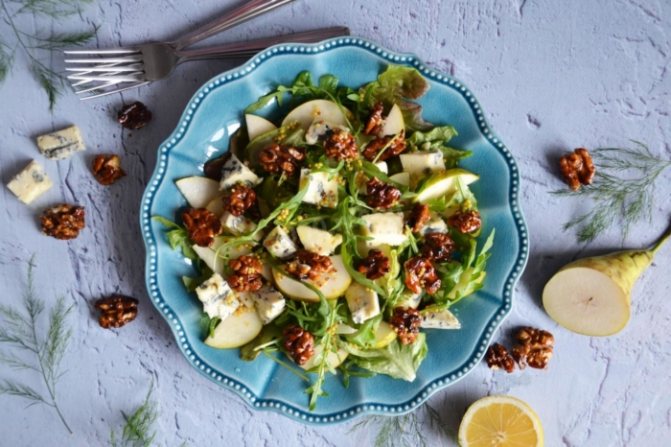
Ingredients:
- feta cheese 100 g;
- 1 medium Conference or Williams pear;
- several sprigs of arugula;
- olive oil;
- chopped nuts as desired.
Preparation:
- Peel the pear and cut into thin slices.
- Cut the cheese into cubes.
- Mix pear, feta cheese and herbs, pour in olive oil, sprinkle with nuts.
Baked fruit with cottage cheese and vanilla

An original way to consume baked pear as a nutritious dessert.
Ingredients:
- 1–2 pears;
- 100 g cottage cheese;
- vanilla.
Preparation:
- Cut the pears in half, remove the core and pits.
- Mix cottage cheese with vanilla. Add your favorite syrup if desired.
- Fill the halves with filling.
- Place in an oven preheated to 180 degrees and bake for 15 minutes.
Pear compote
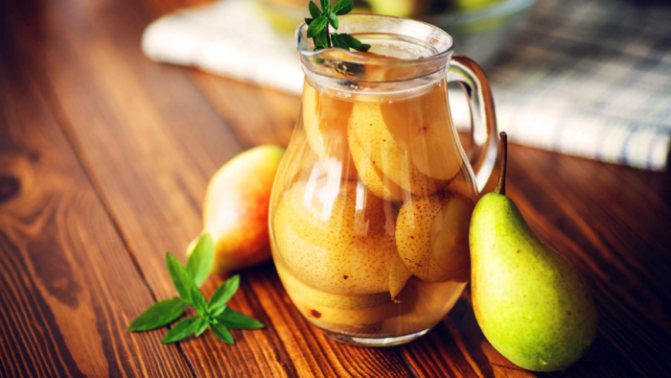
It is best to prepare this compote without sugar and store it in the refrigerator for no more than 2-3 days. Dried pear fruits are much sweeter than the fruits themselves, so compote with them will have a richer taste. You can prepare it like this:
- Pour 500 grams of fresh or 250 grams of dried pears with two liters of water.
- Boil.
- You can add a few drops of lemon juice to the finished drink.
In fact, the connection between pear and colic has not been confirmed; experts have not yet proven a direct connection between its consumption and the reactions of the child’s gastrointestinal tract.
Pear is one of the first foods introduced into the diet of both mother and child. You shouldn’t be afraid of such a harmless fruit, but you don’t need to abuse it either.
According to WHO recommendations, part of a mother's healthy diet should be fruits, which are consumed by a woman every day in the amount of 300–400 grams. Be healthy!
Possible contraindications and side effects
Pear is considered a safe fruit, useful for maintaining the health of a mother and her newborn baby. But its use during breastfeeding should definitely be avoided:
- when the newborn is less than 3 months old;
- if the baby suffers from colic;
- in case of diathesis of the child;
- for any other manifestations of allergic reactions in the baby.
We recommend that you familiarize yourself with the peculiarities of using watermelon while breastfeeding.
For the body of a young mother, the fetus is dangerous only in case of individual intolerance to individual components. But, if a nursing woman abuses pears, the fruit can have a negative effect on the baby.
- In this case, the baby may experience:
- skin rash;
- itching;
- body redness;
- all kinds of digestive disorders.
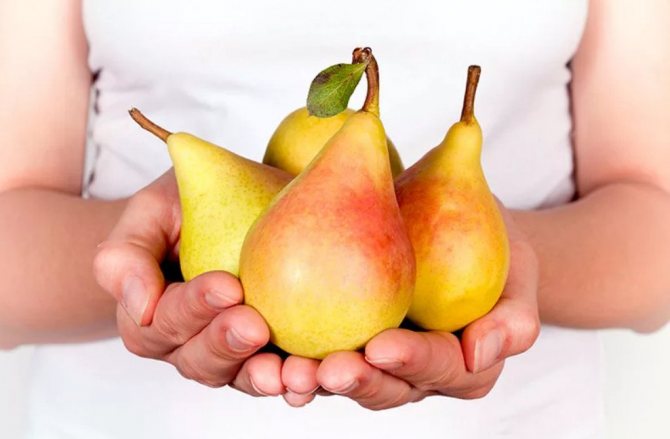
Pear is not only an aromatic and tasty fruit, but also a storehouse of all kinds of vitamins, minerals and nutrients. It is one of the first to be included in the nursing diet and complementary feeding of the baby, but this should be done with extreme caution and in small portions. In addition, during the first 2-3 months of feeding, the fruit is undesirable for a young mother, otherwise colic in the baby cannot be avoided. This must be taken into account by all mothers who, in the future, want to prevent any health problems in their baby.

